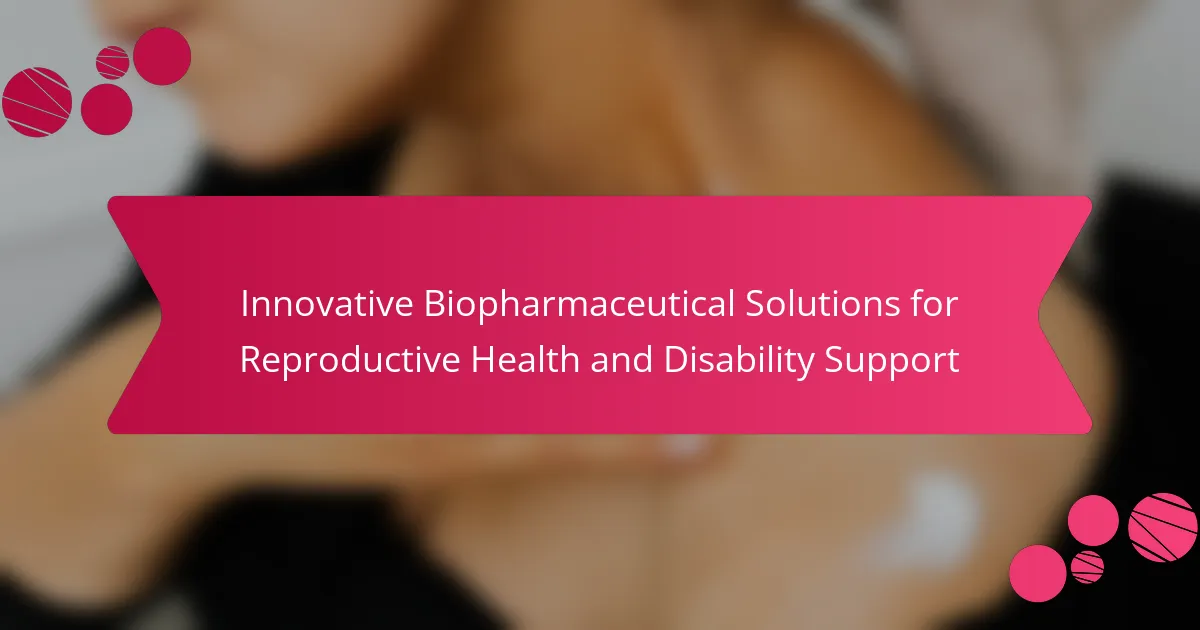Innovative biopharmaceutical solutions are transforming reproductive health and disability support by improving treatment efficacy and patient outcomes. These advancements include personalized medicine, targeted therapies for chronic conditions, and gene editing technologies. Additionally, regulatory frameworks play a crucial role in shaping access to these life-changing therapies. As these innovations continue to evolve, they promise enhanced quality of life for individuals facing reproductive challenges and disabilities.

How do innovative biopharmaceutical solutions enhance reproductive health?
Innovative biopharmaceutical solutions significantly enhance reproductive health by targeting specific conditions and improving treatment efficacy. These solutions include advanced therapies that address hormonal imbalances and genetic disorders. For instance, personalized medicine approaches tailor treatments based on individual genetic profiles, leading to better outcomes. Additionally, biopharmaceuticals can reduce the side effects associated with traditional treatments, promoting overall well-being. As a result, patients experience improved reproductive health and enhanced quality of life.
What are the key benefits of biopharmaceuticals in reproductive health?
Biopharmaceuticals offer significant benefits in reproductive health by enhancing treatment efficacy and safety. They target specific conditions, leading to improved outcomes for patients facing infertility and hormonal imbalances. For instance, biopharmaceuticals can provide personalized therapies that adapt to individual patient needs, resulting in higher success rates in assisted reproductive technologies. Additionally, they often have fewer side effects compared to traditional medications, making them a safer option for long-term use. These innovations contribute to better management of reproductive health challenges, supporting overall well-being and quality of life for individuals and couples.
Which conditions can be treated with these solutions?
Innovative biopharmaceutical solutions can treat conditions such as infertility, hormonal imbalances, and reproductive system disorders. They also support individuals with disabilities by addressing related health issues. These treatments enhance reproductive health and improve quality of life for patients.
How do these solutions compare to traditional treatments?
Innovative biopharmaceutical solutions often provide more targeted and effective outcomes than traditional treatments for reproductive health and disability support. These modern therapies utilize advanced technologies and personalized approaches, leading to improved patient experiences and outcomes.
For example, traditional treatments may involve broad-spectrum medications with significant side effects, while innovative solutions focus on specific biological pathways, reducing adverse reactions. Additionally, biopharmaceuticals can offer faster recovery times and enhanced efficacy, as they are designed to address the unique needs of individuals.
Overall, the shift towards innovative biopharmaceuticals reflects a commitment to personalized healthcare, aiming to optimize treatment effectiveness and patient satisfaction.

What role do biopharmaceuticals play in disability support?
Biopharmaceuticals play a crucial role in enhancing disability support by providing targeted therapies that improve patient outcomes. These innovative solutions address various health challenges, including chronic pain, mobility issues, and mental health disorders.
For instance, biopharmaceuticals can alleviate symptoms associated with conditions like multiple sclerosis and rheumatoid arthritis, significantly enhancing the quality of life for individuals with disabilities. Additionally, advancements in biopharmaceutical research have led to personalized medicine, allowing treatments to be tailored to individual patient needs.
Furthermore, biopharmaceuticals contribute to rehabilitation processes, promoting faster recovery and better management of disability-related complications. Their ability to target specific biological pathways results in more effective interventions compared to traditional treatments.
Which disabilities can benefit from biopharmaceutical interventions?
Biopharmaceutical interventions can significantly benefit various disabilities, including neurological disorders, autoimmune diseases, and genetic conditions. These treatments often target specific pathways, providing tailored solutions for individuals. For example, multiple sclerosis patients may experience improved mobility and reduced symptoms through biopharmaceutical therapies. Similarly, conditions like muscular dystrophy can see enhanced muscle function and quality of life. The innovative nature of these interventions allows for personalized approaches, addressing unique needs effectively.
How do these solutions improve quality of life for users?
Innovative biopharmaceutical solutions significantly enhance quality of life for users by addressing reproductive health and providing disability support. These solutions improve physical well-being, emotional health, and social integration. For instance, targeted therapies can alleviate symptoms of reproductive disorders, leading to better overall health outcomes. Additionally, assistive technologies enhance mobility and independence for individuals with disabilities, fostering a sense of empowerment. As a result, users experience increased life satisfaction and improved daily functioning.
What are the challenges in implementing these treatments for disabilities?
Implementing innovative biopharmaceutical solutions for disabilities faces several challenges. These include regulatory hurdles, high development costs, accessibility issues, and varying patient responses. Additionally, integrating new treatments into existing healthcare systems can be complex, requiring extensive training and support for healthcare providers.

What are the latest advancements in biopharmaceutical research for reproductive health and disability support?
Innovative biopharmaceutical solutions are advancing reproductive health and disability support through targeted therapies and personalized medicine. Recent developments include gene editing technologies, such as CRISPR, which offer potential treatments for genetic disorders affecting reproduction. Additionally, advancements in hormone therapies are improving fertility outcomes for individuals with disabilities. Research is also focusing on biopharmaceuticals that enhance reproductive health by addressing conditions like endometriosis and polycystic ovary syndrome. These innovations aim to provide safer, more effective treatment options tailored to individual needs, ultimately enhancing quality of life.
Which innovative compounds are currently in clinical trials?
Several innovative compounds are currently in clinical trials focusing on reproductive health and disability support. Notable examples include novel hormonal therapies for infertility, regenerative medicines targeting spinal cord injuries, and gene therapies aimed at genetic disorders affecting reproductive capabilities. These trials explore unique mechanisms and potential benefits, such as improved efficacy and reduced side effects compared to existing treatments. As research progresses, these compounds may significantly enhance patient outcomes in these critical areas.
How does technology influence the development of new biopharmaceuticals?
Technology significantly accelerates the development of new biopharmaceuticals by enhancing research capabilities and streamlining production processes. Advanced techniques like CRISPR gene editing and AI-driven drug discovery lead to targeted therapies. For instance, biopharmaceuticals for reproductive health utilize innovative delivery systems to improve efficacy. Additionally, technology facilitates personalized medicine, tailoring treatments to individual patient profiles, ultimately improving outcomes in reproductive health and disability support.

How do regulatory frameworks impact biopharmaceutical solutions globally?
Regulatory frameworks significantly influence the development and distribution of innovative biopharmaceutical solutions for reproductive health and disability support globally. These frameworks establish safety, efficacy, and ethical standards, directly affecting market access and research funding.
For instance, stringent regulations can delay product launches, impacting availability in various regions. Conversely, supportive regulations can foster innovation, leading to faster access to life-changing therapies. Countries with harmonized regulations often see increased collaboration and investment in biopharmaceutical research, enhancing global health outcomes.
Additionally, regulatory environments that promote transparency and patient involvement can improve trust and adoption of new treatments. As a result, effective regulatory frameworks are crucial for advancing biopharmaceutical solutions that address reproductive health and support individuals with disabilities.
What are the differences in regulations across regions?
Regulations for innovative biopharmaceutical solutions vary significantly across regions. Factors such as approval processes, clinical trial requirements, and post-market surveillance differ widely.
In the United States, the FDA prioritizes rigorous clinical trials and safety evaluations, while the European Medicines Agency emphasizes comprehensive data on efficacy and safety. In contrast, emerging markets may have expedited approval processes to encourage innovation, often with less stringent regulatory oversight.
Additionally, reimbursement policies for reproductive health and disability support products can vary, impacting access and affordability. For example, some countries may provide full coverage for certain treatments, while others may require out-of-pocket expenses.
Overall, understanding these regulatory differences is crucial for stakeholders in the biopharmaceutical industry to navigate market entry and compliance effectively.
How do these regulations affect the availability of treatments?
Regulations can limit the availability of innovative treatments in reproductive health and disability support. Strict approval processes and compliance requirements may delay product launches and reduce market access. These barriers can hinder patient access to essential therapies, impacting overall health outcomes. Additionally, regulations may influence research funding and investment in new biopharmaceutical solutions, further affecting treatment availability.

What are the economic implications of biopharmaceutical solutions for reproductive health and disability support?
Innovative biopharmaceutical solutions significantly enhance reproductive health and disability support, leading to economic growth. These solutions increase access to healthcare, reduce long-term costs, and improve workforce participation. For instance, advances in fertility treatments can decrease the economic burden of infertility, while effective disability therapies can boost productivity. As a result, the overall economic implications are profound, fostering a healthier, more inclusive society.
How do these solutions affect healthcare costs?
Innovative biopharmaceutical solutions can significantly reduce healthcare costs by improving treatment efficacy and patient outcomes. These solutions often lead to fewer hospitalizations and lower long-term care expenses. For instance, advancements in reproductive health therapies can decrease complications, thus minimizing the financial burden on healthcare systems. Additionally, disability support innovations enhance quality of life, enabling individuals to maintain independence, which further reduces reliance on costly medical services.
What is the market potential for innovative biopharmaceuticals?
The market potential for innovative biopharmaceuticals in reproductive health and disability support is substantial. The global biopharmaceutical market is projected to reach approximately $500 billion by 2026, driven by advancements in personalized medicine and biologics. These solutions address unmet needs in reproductive health, such as fertility treatments and hormonal therapies, while also providing critical support for disabilities through targeted therapies. The increasing prevalence of reproductive health issues and disabilities further enhances demand, creating opportunities for innovative therapies that improve patient outcomes.

What are the ethical considerations surrounding biopharmaceuticals in reproductive health and disability support?
Ethical considerations in biopharmaceuticals for reproductive health and disability support include patient autonomy, informed consent, and equitable access. These aspects ensure that individuals make informed choices about their health interventions.
Additionally, the potential for genetic manipulation raises concerns about eugenics and discrimination. Stakeholders must navigate these complexities to promote ethical practices in development and distribution.
Transparency in clinical trials is crucial. It fosters trust and allows for scrutiny of the effects of biopharmaceuticals on diverse populations. Ethical guidelines must evolve alongside advancements in technology to address emerging challenges.
Finally, the balance between innovation and safety is vital. Regulatory frameworks should ensure that new biopharmaceuticals are both effective and safe for all individuals, particularly vulnerable populations.
How do ethical concerns influence research and development?
Ethical concerns significantly shape research and development in innovative biopharmaceutical solutions for reproductive health and disability support. These concerns ensure that the welfare of participants is prioritized, informed consent is obtained, and equitable access to treatments is promoted.
For example, ethical guidelines dictate that research must not exploit vulnerable populations. This adherence fosters public trust and encourages collaboration among stakeholders. As a result, ethical frameworks can lead to more effective and responsible innovations that address real-world health challenges.
Moreover, regulatory bodies often require ethical reviews before projects can proceed, impacting timelines and funding availability. This scrutiny can enhance the quality of research by ensuring comprehensive assessments of potential risks and benefits.
In summary, ethical considerations drive the integrity and social responsibility of research, ultimately influencing the development of biopharmaceutical solutions in reproductive health and disability support.
What are the perspectives of patients and healthcare providers?
Patients and healthcare providers generally view innovative biopharmaceutical solutions for reproductive health and disability support positively. Patients appreciate advancements that enhance treatment efficacy and accessibility. Healthcare providers recognize the potential for improved patient outcomes and adherence to treatment protocols.
Both groups emphasize the importance of personalized care, highlighting the need for tailored therapies that address individual health needs. Collaborative decision-making is crucial, as it fosters trust and ensures that patients feel empowered in their treatment journeys.
Furthermore, ongoing education about these solutions is vital. Patients seek clarity on benefits and potential side effects, while providers require updates on emerging therapies to offer informed recommendations. Overall, a shared commitment to advancing reproductive health and disability support drives the conversation between patients and healthcare providers.

What future trends can we expect in biopharmaceutical solutions for reproductive health and disability support?
Innovative biopharmaceutical solutions are set to transform reproductive health and disability support through advancements in personalized medicine, gene therapy, and digital health technologies. These trends will enhance treatment efficacy and accessibility.
Personalized medicine will tailor therapies to individual genetic profiles, improving outcomes for reproductive health conditions. Gene therapy will address genetic disorders linked to reproductive issues, offering potential cures rather than just management.
Digital health technologies will facilitate remote monitoring and support, ensuring continuous care for individuals with disabilities. These innovations can lead to improved quality of life and better health management.
As a result, the future of biopharmaceutical solutions in these areas promises significant improvements in treatment effectiveness and patient engagement.
How will patient-centered approaches shape future developments?
Patient-centered approaches will drive innovative biopharmaceutical solutions by prioritizing individual needs and preferences. This shift will enhance reproductive health and disability support through tailored therapies and improved patient engagement. For example, personalized medicine can lead to more effective treatments and better health outcomes. As a result, companies will focus on developing solutions that align with patient values and experiences, fostering a more responsive healthcare environment.
What role will personalized medicine play in these solutions?
Personalized medicine will significantly enhance innovative biopharmaceutical solutions for reproductive health and disability support by tailoring treatments to individual patient needs. This approach improves treatment efficacy and reduces adverse effects. For example, genetic profiling can identify the most effective medications for specific conditions, ensuring optimal outcomes. Personalized strategies also address unique attributes of patients, such as their genetic makeup and lifestyle factors, leading to more precise interventions. As a result, the integration of personalized medicine can transform reproductive health and disability support, making treatments more effective and patient-centered.
What best practices should stakeholders follow to optimize outcomes?
Stakeholders should prioritize collaboration, data-driven decision-making, and patient-centered approaches to optimize outcomes. Engaging cross-functional teams enhances innovation in biopharmaceutical solutions for reproductive health and disability support.
Utilizing real-world evidence can guide the development of targeted therapies, improving efficacy and safety. Regular feedback from patients ensures that solutions meet their needs effectively.
Investing in continuous education for stakeholders fosters a culture of innovation and responsiveness. This commitment can lead to better health outcomes and enhanced quality of life for patients.
Lastly, establishing metrics for success allows stakeholders to track progress and make necessary adjustments in real time. This proactive approach is essential in the dynamic field of biopharmaceuticals.
